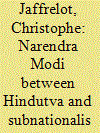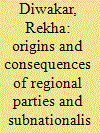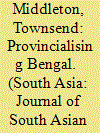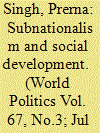|
|
|
Sort Order |
|
|
|
Items / Page
|
|
|
|
|
|
|
| Srl | Item |
| 1 |
ID:
145492


|
|
|
|
|
| Summary/Abstract |
After the 2002 pogrom, Narendra Modi, the Chief Minister of Gujarat, shifted his political repertoire from that of a Hindu Hriday Samrat (King of Hindus’ heart) to that of development and Gujaratiness. He claimed that he was a development man (Vikas Purush) and that he represented the 60 million Gujaratis as an aam admi (common man). He projected himself as an embodiment of their identity—asmita. This populist repertoire, which was explicitly articulated during the Sadbhavna mission in 2012, is in tune with the general trend of Indian politics where most of the Chief Ministers claim to epitomize one subnationalism. In the case of Narendra Modi, however, this regional identity was defined in religious terms and reflected a banalization of Hindutva, an original process that was more likely to happen in Gujarat because of the traditional definition of the state’s identity.
|
|
|
|
|
|
|
|
|
|
|
|
|
|
|
|
| 2 |
ID:
178566


|
|
|
|
|
| Summary/Abstract |
This article explores the origins and consequences of India’s regional parties and subnationalism, focusing and expanding on the key arguments made by Prerna Singh and Adam Ziegfeld in their books. According to Singh, when political leaders promote an inclusive form of subnationalism, it creates a feeling of cohesive solidarity across the region, which helps to achieve superior social welfare outcomes in the Indian states. Ziegfeld provides an elite-centered explanation for the emergence and success of India’s regional parties, and considers Indian politics to be dominated by clientelistic relationships between parties and voters, which leads to delivery of particularistic rather than public goods. The article also discusses two key themes emerging from the books relating to the importance of subnational versus national identity, and the significance of interests versus ideas in shaping Indian politics and public policy. Finally, it identifies future areas for research on regional parties and subnationalism in India.
|
|
|
|
|
|
|
|
|
|
|
|
|
|
|
|
| 3 |
ID:
170471


|
|
|
|
|
| Summary/Abstract |
Written against the backdrop of Darjeeling’s 2017 Gorkhaland agitation, this essay chronicles the colonialisations—first British, now Bengali—that undergird this subnationalist struggle. The analysis challenges romanticised views of Darjeeling, presenting instead a case study of internal colonialism. As an exercise in post-colonial thought, it leverages the view from Darjeeling to explore a notable lacuna in our reckonings of subalternity. A place long thought to be ‘above it all’ here begs its own history from below. Heeding Gorkhaland’s call, the essay proposes ‘provincialising Bengal’ as a means to productively address the internal colonialism at hand, and therein rethink Bengal and its peripheries.
|
|
|
|
|
|
|
|
|
|
|
|
|
|
|
|
| 4 |
ID:
139923


|
|
|
|
|
| Summary/Abstract |
The quality of life that a person leads depends critically on where it is led. Even taking into account levels of economic development, the chances of an individual surviving through infancy, growing up literate, or living a healthy, long life vary dramatically across regions of the world, in different countries, and within the same country. What are the causes of such variation in wellbeing? This article points to a factor that has been virtually ignored in the vast scholarship on social welfare and development—the solidarity that emerges from a sense of shared identity. The argument marks an important departure from the traditional emphasis on the role of class and electoral politics, as well as from the dominant view of the negative implications of identity for welfare. Combining statistical analyses of all Indian states and a comparative historical analysis of two Indian provinces, Kerala and Uttar Pradesh, this article demonstrates how the strength of attachment to the subnational political community—subnationalism—can drive a progressive social policy and improve developmental outcomes.
|
|
|
|
|
|
|
|
|
|
|
|
|
|
|
|
|
|
|
|
|